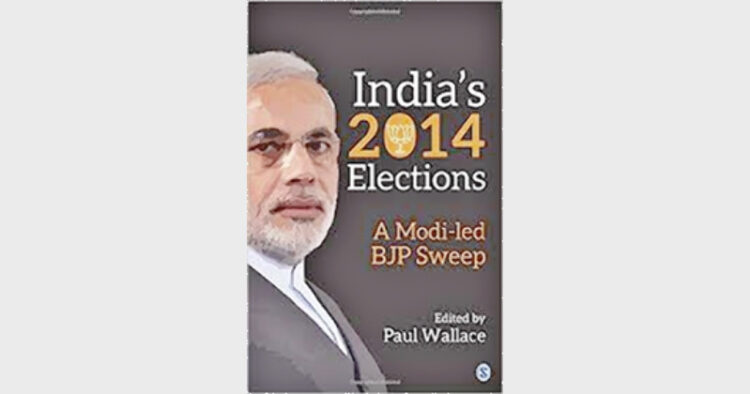| India’s 2014 Elections : A Modi-led BJP Sweep, Paul Wallace (ed.), Sage Publications India Pvt Ltd, Pp 427, Rs 1,250 |
Bharat is a country where democracy is very much alive and kicking and this has been amply shown by the 2014 elections. The peaceful transfer of power following the 16th General Elections shows the maturity, the conviction and enlightenment of the voters when they voted for the Bharatiya Janata Party (BJP), which made a clean sweep, crossing the 272 number, that is, the number of seats required to form a government. Here is a book which is a compilation of papers by various scholars who have thrown up various perspectives while presenting their own analyses and conclusions. Since Chapter 1 is the Preface, we go to Chapter 2 which emphasises that “apparent nationalisation of Indian politics should be treated with caution as regional parties remain ‘resilient’, especially in the non-Hindu areas.” Chapter 3 is based on Walter Andersen’s pre-election interviews with Narendra Modi and senior BJP and RSS leaders. Andersen expresses that if Modi achieves his agenda, the chances of a lengthy tenure and transforming the BJP into a loyal instrument of power and an agent of change are good.
In Chapter 4, Rainuka Dagar examines gender and women from various societal and electoral perspectives and says that “political efficacy for legitimate concerns remains a goal…faultlines across identities of gender, caste and religion in a fragmented polity need to be redefined.” Chapter 5 says that the government will have to address the concerns of a “scam-weary public” and the need for “transparency and accountability”; also that the civic bodies need to complement the “existing democratic institutions without supplanting or overturning them” as Kejriwal and his AAP seem to be keen on doing.
In the second part of the book, we have chapters 6 to 17, where Chapter 6 explains BJP’s near sweep in Uttar Pradesh where the party’s “spectacular victory” was due to the “revival of its organisation and social base, making deep inroads into the backward and Dalit base which had become a stronghold of parties like the SP and BSP and creating a broad “Hindu vote bank”. Here the writers praise Amit Shah for appealing to all sectors of the population, including the non-Hindus, through use of Hindutva and development as two important planks. Chapter 7 discusses leadership and development as themes of Modi in Bihar while criticising Nitish Kumar’s rule in a state which is caste-ridden and where the success of the BJP’s election campaign is to be seen against the voters’ relinquishment of the “permanent identity” of caste and religion.
Chapter 8 talks of BJP’s clean sweep in Delhi for all the seven Lok Sabha seats as seen against its historical and demographical background. While the Congress was decimated and finished ‘a poor third in all seven seats’, Muslim votes were split between the AAP and Congress while BJP consolidated its upper caste and OBC votes. Chapter 9 features Punjab, the only state which did not succumb to Modi wave as here his “leadership as a factor became secondary to anti-incumbency”, says the writer of this paper. J&K, as per Chapter 10, saw a higher voter turnout, the Modi factor, frustration within the incumbent regime’s inability to push development, its tolerance of corruption and poor governance in each of the regions – Jammu, Ladakh and Kashmir, with each manifesting distinctive demographic patterns.
Gujarat in Chapter 11 focuses on BJP’s marketing and professional skills versus fragmented Congress’s defeatism and decline. Chapter 12 talks of the major issues resulting in the NDA sweep besides examining the implications for inter-party competition between the BJP and Shiv Sena as well as the Congress and the NCP. Chapter 13 on West Bengal highlights the decline of Left Front and establishment of Trinamool Congress as the dominant party, with Mamata Banerjee joining other regional parties to form her government. Chapter 14 reveals that AIADMK and DMK virtually ignored the Congress and the BJP and a regional pattern of politics emerged with AIADMK winning a landslide victory without allies.
Andhra Pradesh and Telangana are centres of focus in Chapter 15 where regional identity and regional interests dominate with Chandrababu Naidu re-emerging as a major political factor in Andhra Pradesh and TRS in Telangana. Chapter 16 highlights the local ‘complex politics’ in Karnataka. In Chapter 17, BJP rebounds from 2011 electoral defeat to win seven out of 14 seats in 2014 because of a spectacular voter turnout, Modi’s campaigning and political changes involving the Bodos.
The book, rich in empirical and quantitative data and focusing on the effects of replacement of Congress-led alliance by a majority BJP as well as the weak against a strong leadership, shows that the 2014 elections have brought a change in political geography of Bharat. Despite a troubled international view of Modi before the elections, Bharat believes that Modi’s ‘Bharat comes first’ and his aspiration to fulfil Bharat’s destiny will see him through the coming years.
(The reviewer is former editor of NBT)














Comments